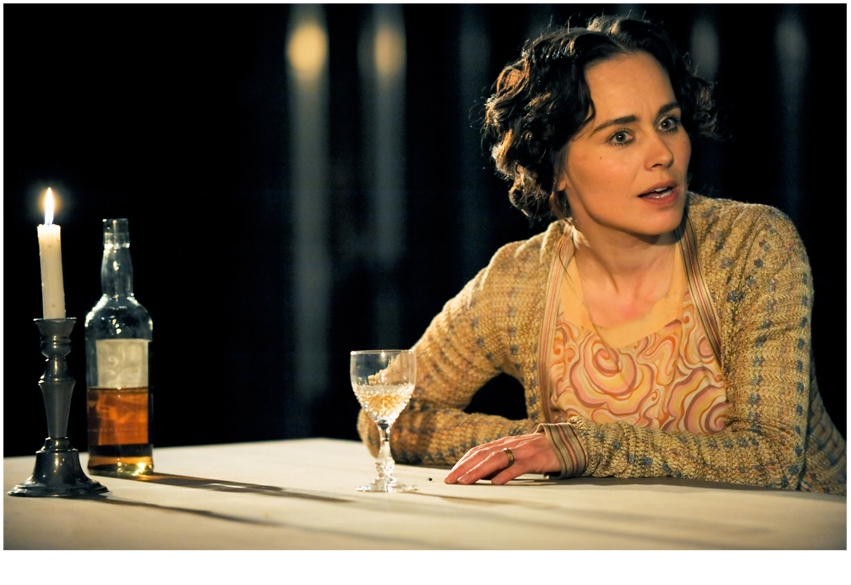Calling all thespians. Roll up, you theatre folk. The Hampstead’s new show is a dramatic love-in you can’t afford to miss. Farewell to the Theatre introduces us to Harley Granville-Barker, one of the greatest playwrights of the early 20th century, as he enjoys a sabbatical in Massachusetts in 1916. Everything is languid, atmospheric and high-minded. Granville-Barker is busy giving lectures and watching American productions of Shakespeare while one of his chums, a literature professor, has had a bust-up with another academic. It’s a pity this off-stage conflict doesn’t test or expose Granville-Barker at all. He just lolls around the garden of a country house making cold, lofty speeches about the theatre and generally being a didactic pest. Other characters blunder in and out saying things like, ‘Perhaps it might rain,’ or, ‘Are there any cakes?’ In a tension-heightening moment, a woman murmurs, ‘I think something bad’s going to happen.’
Plays of this kind are very commonplace. Writer Richard Nelson, like many a hopeful before him, has chosen to emulate the most imitable of great playwrights, Chekhov. It’s a perfectly understandable mistake. All that humdrum mundanity, all that actionless dialogue, all those elegantly ruined mansions full of washouts and bores indulging in absurd and predictable antics. No sweat, says the wannabe genius, I could do that! But he finds he can’t. Chekhov, he soon learns, is a miracle worker who imparts a magical dynamism and vibrancy to his mildewed characters and their vacuous natter. So the chastened copycat, having discovered that Chekhov is beyond him, quietly shreds his script and turns his talents to a fresh arena (possibly bar work or telesales).
What he doesn’t do — or shouldn’t do — is to send his play to Ed Hall, the Hampstead supremo, with a Post-it note attached saying, ‘Herewith my Chekhovian masterpiece!’ Not only has Ed Hall accepted the show but he’s put it in the hands of the seasoned and versatile director Roger Michell. The Chekhovian boredom, I have to say, comes across beautifully. But nothing else remotely Chekhovian, let alone entertaining, makes it on to the stage.
Well-connected Mr Michell has summoned a top-notch cast to his yawn-in. Ben Chaplin, as Granville-Barker, fills his three-piece suit nicely enough. Tara Fitzgerald is luminously beautiful and entirely wasted as a simpering halfwit called Beatrice. Jemma Redgrave swans around bravely as poor sad Dorothy, a widow so committed to her grief that she isn’t just wearing that black dress, she’s growing it. Sad to say, this bit of knock-off Chekhov hasn’t quite sold out even though Hampstead Theatre stands bang opposite a famous grooming parlour for luvvies known as Central School of Speech and Drama. And still they won’t come. Clearly, word has spread among the apprentice thesps that this is a study-tool they can profitably avoid. And if they aren’t interested why should anyone else be?
A new musical is always a risky enterprise. Doubly so if the script isn’t based on a literary property with a ready-made following. Writers Andrew Taylor and Desmond O’Connor have gambled that the world’s financier-phobia will attract eager crowds to their new show, Toxic Bankers. The venue, a cramped Soho basement, is wonderfully atmospheric. And the writers understand and sympathise with banking. That helps a lot. We meet Tony who manages an ethical hedge fund that refuses to indulge in short selling and has avoided Greek sovereign debt. But his leading analyst, the shy Fiona, digs through the crusts of financial obfuscation and discovers that the fund has broken its own code. Evil Tony stands to make a fortune if Greece defaults. Which it promptly does. Portugal, Spain and Italy follow, and Tony piles into the market buying up swaths of cheap public assets. Within hours he owns most of the southern Mediterranean (apart from the Acropolis). But anti-capitalists have infiltrated the firm and are threatening to bring Tony down.
The show is terrific fun. All the characters are credible and a good laugh. The production has a warm heart, a light touch and a witty, fleet-footed script. To get so many things right is very hard. But it’s not enough. A hit musical has to get everything right. Here, some of the tunes are a bit too mawkish for a frivolous satire. The shared melodies and counterpoint sections can be hard to follow. The final act loses power as the storyline breaks up into four discrete plot lines when what’s needed is a general convergence and a single transformative moment.
The excellent cast have been very well drilled. Hazel Gardner is great as the tremulously inadequate Fiona, and Jonathan Dryden Taylor makes a great boo-hiss villain as Tony. The writers have talent and brains. I hope they have persistence too. Their next show could be the one.







Comments